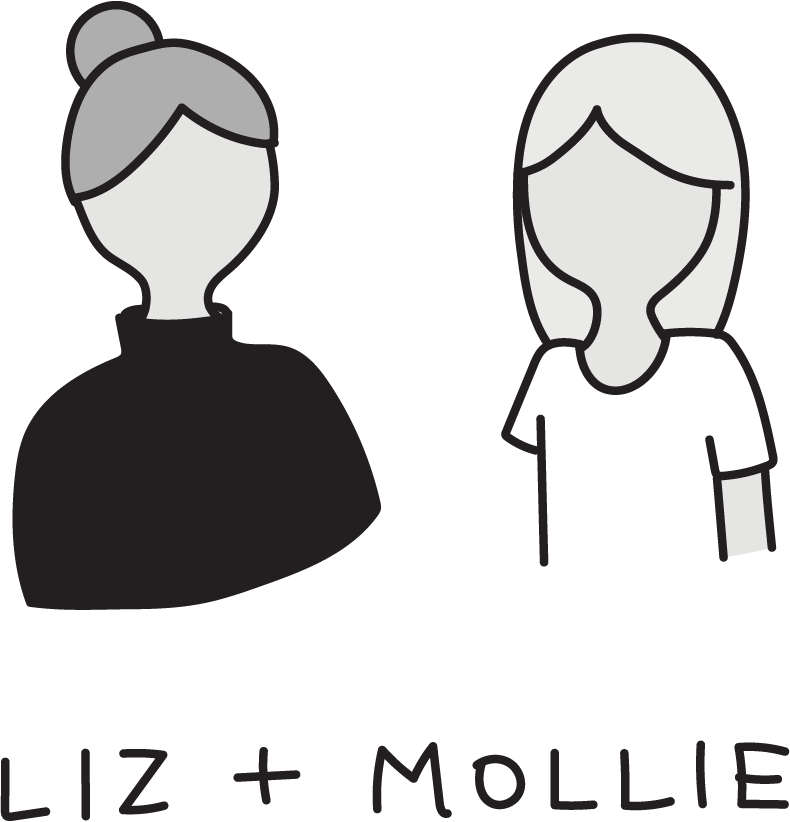In this series, first-time authors Mollie and Liz take readers through the emotional ups and downs of pitching and writing their forthcoming book. Each post will cover a different part of the process in chronological order. We’ll provide the behind-the-scenes details, like emails from our agent and editor, and we’ll get real about our own feelings regarding contracts, deadlines, and collaborative writing.
I’ve always loved the intersection of math and art. In 2012, I began creating “qualitative data visualization” projects in which I tried to model topics that are often considered unquantifiable (e.g. love and feelings). One of my projects, 14 Ways an Economist Says I Love You, which reimagines economic concepts as love notes (e.g. “The marginal returns of spending time with you will never diminish” and an accompanying chart) went viral that year and was featured on the Freakonomics blog, on the front page of the Economist.com, and by the Financial Times.
As I found out later, Lisa DiMona, a literary agent at Writer’s House, saw the piece, began following my subsequent work, and two years (!) later, liked a tweet in which I linked to one of my illustrated stories.
I must have been feeling particularly narcissistic or needy that day, so I decided to look at the profile page of everyone who liked my tweet. I saw in Lisa’s bio that she was a literary agent and thought, “Oh sh!t, I would love to write a book. Maybe I should email her?” I finally did write her a note (subject line: “You liked my tweet a while ago - follow up!”), though it took me two months to work up the courage to hit send. Lisa and I hit it off, met in person, and in the fall of 2014, I signed a contract with Writer’s House and Lisa became my literary agent. Life was magical and I thought I had sailed over the hardest hurdle. Now all I had to do was write a book.
How wrong I was. Writing a book is a grueling and lonely process. I spent the next year putting a few ideas together but nothing seemed catchy or ambitious enough to fill an entire book. I was also set on writing something dense and intelligent that combined, well, everything (illustrations, charts, research, empirical evidence). My dream was to create an utterly charming but rigorous argument in favor of… I didn’t know.
Enter Mollie! In 2015, Mollie and I began writing articles on how it feels to be an introvert in a workplace designed for extroverts. Our skills, personalities, and writing&illustrating processes were complementary, so working together not only felt like a very natural progression of our friendship but also was easy.
After an article we wrote for Quiet Revolution, 6 Illustrations That Show What It’s Like in an Introvert’s Head, went viral with 1.5 million views (it was republished on several other websites including Huffington Post, where it had more than 80,000 views), two things became clear. First, an illustrated and affectionate look at how X why feelings matter at work seemed to strike a chord with readers. And second, Mollie and I worked together so well that I began to think we should write a book together. Mollie had obviously been thinking the same thing, because one afternoon as we joked about writing something more extensive together, the conversation quickly turned into a serious discussion. It was something like, “Hey wouldn’t it be funny if we wrote a book expanding on this article together?” “Haha yes! …. maybe … we should actually do it?” “Oh snap, we totally should.”
In July 2016 I wrote an email to Lisa. Here are a few snippets:
Hi Lisa,
Hope you are well! I will get straight to the point.... so obviously my book writing has been moving at an unfortunately glacial pace. What do you think of me writing/designing/illustrating a book with a friend of mine?
I'm happy to talk more/provide more info on Mollie but would love to hear your initial thoughts. I've found the idea of writing/working on such a massive project with a partner, especially someone who balances me out so well exciting and less daunting. Our book would focus on feelings about/at work and how they influence productivity/creativity/performance etc. We'd like to weave in our own narrative either through informal blurbs or conversation sections at the end of each chapter (though obviously we'd be open to whatever).
A few days later, Mollie met with Lisa in New York. They instantly liked each other and the rest is history! Mollie and I signed a joint agreement with Lisa and Writer’s House in August 2016. Life was magical and we thought we had sailed over the hardest hurdle….
How wrong we were!!
Mollie: Looking back, I realize that I completely lucked out by having Liz already snag an agent. I know that normally it takes time to find a good agent who is interested in your book idea. Liz’s hard work (and tweeting) had paid off, and we’ve loved working with Lisa ever since. She’s the ideal balance of cheerleader and demanding-teacher-who-you-want-to-please.
Next up: the proposal. :D
